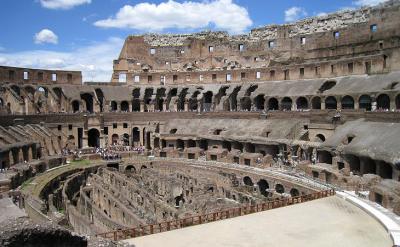Colosseum to be rejuvenated in 18.5 mln euro project

ROME- An ambitious 18.5-million-euro project was announced on Twitter to restore Rome’s iconic Colosseum to its former glory as an arena by Italian Minister of Culture Dario Franceschini on Tuesday. Although lacking the gladiatorial battles of the Roman Empire, the Colosseum is expected to provide spectacles of a “high cultural level”, allowing people from all over the world to revel in an unparalleled experience, with a sustainable use of Rome’s ancient amphitheatre.
The project took root in the research of Daniele Manacorda, professor of the Methodology of Archeological Research at Roma Tre University, which was published in Archeo magazine in July last year.
The archaeologist compared the current state of the Colosseum to photos from the 19th century, when the Colosseum had “more life” because the arena was used, both publically and privately. The gradual removal of the arena through the last centuries, exposing the formerly underground parts of the famed monument, has led to many archaeological findings but Manacorda believes that the exposed sections “(are) something that should remain underground”. The project founders hope to establish a museum dedicated to the underground section so that tourists can have the chance to see the inner workings of the Colosseum. The academic also sees that the restoration will benefit tourism, but will also bring the Colosseum to the modern day, by allowing all kinds of events to be held in Italy’s symbolic landmark.
The plans for the Colosseum form part of the campaign to rejuvenate Italy’s cultural heritage, which also includes the reorganisation and renovation of the Uffizi Gallery in Florence. The extensive 80-million-euro project was approved on Tuesday by the Italian Ministry of Culture, which allocated 36.5 million euros to the project for the two popular cultural sites.
The green light given for this project comes in the midst of protests and unrest in Rome, where public transport delays, strikes and infrequent waste disposal have caused Romans to complain about the lack of spending on the maintenance of public transport and waste management.


